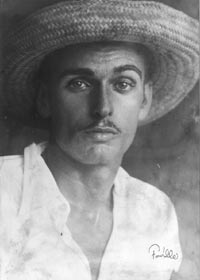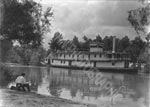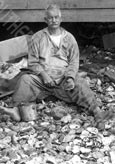
Fonville's artistry can be compared wth other photographic greats, like Ansel Adams, but it is more personal, more in touch with humanity than most photography.
 THEODORE FONVILLE
WINANS THEODORE FONVILLE
WINANS Born in Mexico, Missouri on August 22 1911, Theodore Fonville Winans bought his first camera, a Kodak 3A, on impulse and soon after won a local photographic contest. He first arrived in Louisiana as a young construction worker and was captivated by the exotic feet of the state. "It was absolutely fascinating to me, it was like being in the darkest Africa... alligators, palmettos and Spanish moss. I tell you, it really grabbed a hold of me. To me it was pure adventure, I loved it." Fonville Winans. In the late 1930,s Fonville settled in Baton Rouge and began his career as a professional photographer. A favorite destination , on his many excursions was the small fishing village of Grande Isle, located south of New Orleans on the Gulf of Mexico.  It was here that he captured some of his most enduring and acclaimed images. Over the next fifty years, from his studio at 667 Laurel Street, he was to photograph nearly every governor, as well as many of Louisiana's most prominent citizens. Fonville began his career as a professional photographer in the late 1930's and for over fifty years traveled the highways and byways of South Louisiana photographing the people and places that define this unique and diverse culture. His many celebrated images have appeared in numerous publications including a book on his life and work entitled Fonville Winan's Politics, People, and Places. A PBS special, "The Cruise of the Pintail", chronicled his journey through South Louisiana on a small boat using a 16mm camera to record his travels.   His work has been honored with
exhibitions throughout the world, including; Los Angeles, London, Paris and
Angers, France. His work has been honored with
exhibitions throughout the world, including; Los Angeles, London, Paris and
Angers, France. In 1990, The Foundation for Historical Louisiana presented Fonville with its prestigious preservation award for his enduring visual record of Louisiana's culture. Since his death in 1992, collector's have paid thousands for his vintage prints. His entire collection is now archived in the Louisiana State University Libraries Special Collections Department. |
If
you have a personal remebrance of Fonville you'd care to share, please e-mail
it by clicking on Fonville
Notes
|
||||||||||
 |
 |
 |
 |
 |
 |
 |
 |
 |
 |
|

 His studio was on the corner of 7th and Laurel, downstairs.
(Upstairs was once the Capitol Lodge Masonic Hall) It had a quaint look about
it, with big windows all around.
His studio was on the corner of 7th and Laurel, downstairs.
(Upstairs was once the Capitol Lodge Masonic Hall) It had a quaint look about
it, with big windows all around. As we look through his eyes today at the
Louisiana of long ago, we see someone with a wonderful grasp of fleeting
moments, of significance sown in the wind.
As we look through his eyes today at the
Louisiana of long ago, we see someone with a wonderful grasp of fleeting
moments, of significance sown in the wind.